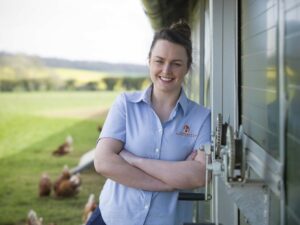Audits are an inevitable part of the farming calendar. But with the right preparation, producers can make sure they’re always ready.
The different requirements of the numerous inspection bodies including the Lion Code, Defra and the RSPCA, as well as egg packers, can sometimes appear challenging, and an unwelcome distraction from the real business of farming. Some audits take half an hour, others take two or three, not counting the hours of preparation required.
However, with the right support, good paperwork and stockmanship, a producer can maintain a level of “audit fitness” that will save time and minimise disruption so that whenever an inspector appears at the farm gate, there is no panic, last-minute cramming or worry that they will find something that is non-compliant.
We think of audits as paperwork checks, but every aspect of a poultry farmer’s business will come under scrutiny from a range of different auditing bodies, each with their own focus; from trading standards to bird welfare. Staying on top of your administration will help you to be ready for any auditor but some expert guidance of their different requirements can save much time and effort.
Readiness requires accurate and up-to-date record keeping in many areas, from pest control to staff training.
Lion Code
Aims: The BEIC’s Lion Code of Practice was set up to assure the quality and safety of eggs and ensure that salmonella is kept out of the food chain. New rules were brought in last year to ensure permanent audit readiness by layer farms, including annual audits, with a minimum being unannounced.
Requirements: Audits take two to three hours, and auditors will physically inspect housing, equipment, egg storage and biosecurity for hygiene and welfare breaches. They will also audit salmonella control, feed and water quality, vet care and medication so your daily checks must be up to date and your records accessible. Auditors will also want to see paper evidence of training of all members of staff.
The Lion Code of Practice is wide-ranging and detailed, so good preparation can make all the difference.
APHA
Aims: Reporting to DEFRA, the Animal and Plant Health Agency (APHA) inspects every poultry farm to ensure that the farmer is complying with bird numbers and marketing regulations.
Requirements: APHA auditors focus on trade description regulations. They inspect at least once per flock to make sure that the birds have access to the range and stocking density required by trades description legislation are adhered to. Inspectors also look for disease prevention and biosecurity measures, so it is important to record regular checks and have them to hand.
RSPCA Assured (formerly Freedom Foods)
Aims: Farms which market their eggs under the RSPCA’s own farm welfare assurance food labelling scheme receive annual, unannounced inspections by scheme assessors to check that they are complying with relevant RSPCA welfare standards.
Requirements: Auditors will check that the RSPCA welfare standards for laying hens are being observed. The RSPCA advises that a suitable person (the farm manager or owner) is available to accompany an assessor. They will also want to see the following paperwork:
- Defra advisory booklets
- Veterinary health plans
- Veterinary medicines and treatment records
- Farm policies
- Staff training records
Although it seems daunting, the audit itself can be made more manageable with the help of an expert advisor who knows what the auditors are looking for.
Audit experience
Before she became the local poultry specialist for Humphrey Feeds and Pullets in mid-Wales, Gwenda Wozencroft worked on a poultry farm near her hometown of Llandrindod Wells, and after graduating she helped farmers with their audit preparations.
“All of the team I work with have a range of skills, and I see audits as a key element of the services that I offer to our customers,” says Gwenda, who helps her customers stay audit ready.
“As the free-range sector becomes more accountable, the packer, feed and pullet supplier all have an interest in the farmer achieving the standards, and verifying that through the audit process. Passing your audits is essential if you want to sell your eggs on the market.”
Case study – guidance from an audit expert
Stephen Jones runs a mixed farm in the Welsh borders, entering free range in 2016.

During his first flock, Stephen needed to pass an initial audit from the Lion Code to sign up with his packer, Fairburn Eggs: “In the beginning we needed a lot of advice from Gwenda on audits and it was hard work,” he says. “But Gwenda made that process much easier and it takes less of my time now, so I can spend more time with the birds.” Stephen does not relish paperwork; “I’m a routines person; I like to do the same thing every day, and the hens like routine too. But that consistency also makes sure things don’t get missed and maintaining audit standards is easier.”
Between Stephen’s diligence and Gwenda’s eye for detail, he has never failed an audit, and that effort is reflected in the results. Stephen’s birds have achieved over 330 eggs per bird for his last two flocks, with low mortality, and as a result he enjoys a good relationship with his packer.
Audit tips
Gwenda Wozencroft advises her customers to maintain a steady state of “audit fitness” rather than wasting days catching up on paperwork backlogs. Much of that readiness comes down to good animal husbandry:

- Keeping sheds clean and tidy
- Keeping on top of paperwork and recording everything (temperatures, egg numbers, cleaning schedules, generator checks, salmonella swabs, medication records etc.)
- Gwenda supplies logbooks for customers to keep information together to present to the auditor
- Ensuring that biosecurity is tight at all times, with suitable barriers, and warning signage clearly displayed
- Walking the sheds routinely, looking for failed equipment, dead birds and recording walks, which is also a Lion Code requirement.
Conclusion
Audit requirements are becoming stricter as agencies encourage farmers to achieve higher standards; biosecurity is a particular focus and is likely to become stricter.
However, Jones says: “If you’re doing your best and auditors see the hens look healthy and the sheds are kept tidy then they are generally happy. But if you’re just ticking the boxes and not doing what you say, they can tell.”
“Basically, audits are about keeping hens happy and productive.”


